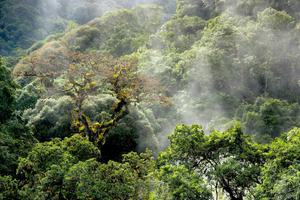Two adult male chimpanzees groom each other in Tai National Park in Ivory Coast. Anna Preis/Tai Chimpanzee Project
Human activity is not only causing chimpanzee populations and habitats to decline, it is also quickly killing what scientists call their “behavioral and cultural diversity” — such as their use of tools, communication techniques, hunting, and bathing, according to a new study published in the journal Science. These skills and traditions are passed from one generation to the next through social interaction and observation, and play a critical role in the survival of chimpanzees.
The new study was led by scientists at the Max Planck Institute for Evolutionary Anthropology and the German Center for Integrative Biodiversity Research. It used data on 31 chimpanzee behaviors from across 144 communities in 15 African countries, obtained non-invasively from camera trap footage, fecal samples that showed evidence of eating foods that require the use of tools, and artifacts of tool use identified during reconnaissance field work.
The data showed that on average, behavioral diversity declined by 88 percent in chimpanzee populations highly impacted by human activity, such as those living near roads, logging operations, farms, and towns.
Chimpanzee populations are declining across their range in Africa, as much as 6 percent per year. The researchers behind the new study argue their findings make the case for a more comprehensive conservation strategy — one that focuses not just on protecting habitat, but that also recognizes and protects chimpanzees’ unique behavioral diversity.
“Our findings suggest that strategies for the conservation of biodiversity should be extended to include the protection of animal behavioral diversity as well,” said Hjalmar Kühl, an ecologist at the iDiv research center and the Max Planck Institute for Evolutionary Anthropology, and lead author of the new study. “Locations with exceptional sets of behaviors may be protected as ‘chimpanzee cultural heritage sites.’ This concept can be extended to other species with high degree of cultural variability as well, including orangutans, capuchin monkeys, or whales.”
VIDEO: Two adult male chimpanzees’ fish for algae in Bakoun, Guinea. (Credit: PanAf/MPI-EVA)



